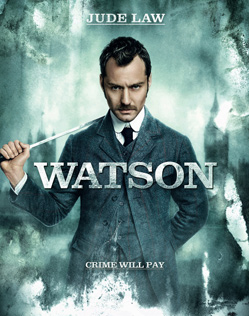
Yesterday in Part 1, we examined three Watsons (speaking of which, did you catch The Two Watsons comic?), but there are more modern Watsons yet to peruse.
As I said when we began: this one’s for the lovers of brave soldiers, able medics, and steadfast friends. And here’s to John Watson, who flew that flag before it was cool. This one’s for the other half of the partnership: the narrator, the everyman turned superhero, the teller of tales, the conductor of light. Sláinte.
EDWARD HARDWICKE; The Return of Sherlock Holmes (Granada 1986-1994)
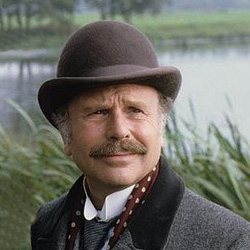
Hardwicke’s Watson is introduced during “The Empty House,” an unpleasant period for the character to say the least. Three years ago, he lost his closest friend when a gnarled little professor of mathematics lured the foremost champion of the law of his generation to a waterfall in Switzerland and then defeated him in the world’s deadliest arm-wrestling match. Thereafter, Watson’s wife Mary passed on (of what we are not told, but one can assume no waterfalls were involved on this occasion). But he is soldiering on like the veteran he is, and has taken an interest in the murder of Ronald Adair, who was killed under the sort of inexplicable circumstances that would have been right up Sherlock “Give Me Problems, Give Me Cryptograms” Holmes’s alley.
Enter Sherlock “Sorry About That, I Seem to Have Only Been Mostly Dead” Holmes. Hardwicke’s portrayal is inevitably older than Burke’s, calmer; this is a man who has stared death in the face more than once and lived to write about it. His voice is measured, thoughtful, and quietly decisive. He owns a remarkable fez. One has absolutely no trouble picturing him patching people together on the plains of Afghanistan, but he also charms distraught clients and furrows his brow at his resurrected roomie when his roomie makes poor decisions. John Watson is always quintessentially British, and yet there is something more British still about Hardwicke’s incarnation. The histories of naval empires are mapped in his eyes.
Lest I give the impression he’s also stodgy, he isn’t. He can, like all the very best John Watsons, giggle helplessly in an armchair at the smallest provocation. His gravity may be necessary to keep Brett’s wild sleuth from flying off the planet, but he is never a burden—he’s as often a merry co-conspirator as a sounding board, and if you require a stout companion on whose assistance you can thoroughly rely, Hardwicke is your man to the last.
CONCLUSION: Hardwicke is both the equal of Burke and his natural successor; he befits Brett’s portrayal of an older, more troubled Holmes without ever losing the sense that there’s nowhere he’d rather be than Baker Street, or else dashing madly off with the world’s only independent consulting detective.
JUDE LAW; Sherlock Holmes and Sherlock Holmes: Game of Shadows (Warner Brothers films, 2009-2011)
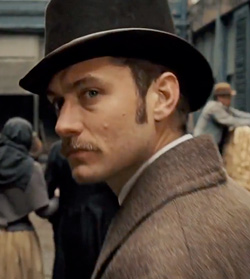
Holmes was always an action hero, if in the 19th century sense of the word. He was a singlestick expert, a boxer, a martial artist. When thrown into the fray, he could handle himself as any gentleman would be expected to do. And when choosing a companion with whom to kick ass and deduce names, he selected a chap just returned from a nasty war, battered and friendless and in need of a new fight. The Warner Brothers film franchise is deemed too heavy on the fistwork as opposed to the brainwork by some. I say let Holmes ripple with testosterone, grimy muscles bulging, while Watson shoots and stabs and judo-chops in his defense. Where’s the problem here? Bring it on, along with my medium-rare ribeye and whiskey with two cubes.
Fighting is what Law’s Watson does best. No, strike that—he’s also a savant at joking, quarrelling, teasing, sighing, glaring, snarking, thinking, and winning. And let us not forget eye-rolling. In both Sherlock Holmes and Game of Shadows, Watson is both devoted to Holmes and deeply exasperated by him; physical scuffles ensue, wigs fly, and fiancées are lost out of train windows. The energy is unbridled, at times to unfortunate effect for the films’ coherence, but Law never loses his focus. Defend the comrade, win the girl, take the prize…he knows how to get a job done, and Downey’s Holmes rather adores him for it.
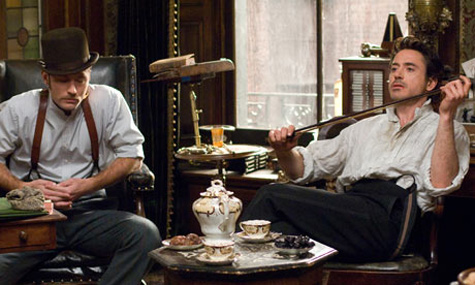
Law is remarkable for his attention to the fact that Dr. Watson did not return from Afghanistan unscathed. We’re a far cry from Bruce, with his avuncular paunch and the breed of obliviousness that would have gotten him killed at the first sign of Ghazis. A Ghazi could have slain Bruce with an overripe banana. Not so with Law, but the battle of Maiwand and the bullet that sent him back to London a wounded pensioner took their toll. His limp troubles him, his gambling is a problem rather than a diversion, and he seems to need Holmes as much as the reverse is true. Most actors naturally accept the paradigm that Watson is the “normal” one, the one fixed point to Holmes’s brilliant mania. Law’s veteran soldier owns dark depths beneath the gallant exterior. But he is no less gallant for them, and that is a remarkable achievement.
CONCLUSION: Best Watson to take with you on a trip to a perilous region as a bodyguard; worst Watson to piss off. Oh, and one of the prettiest of the herd. Did I fail to mention that before? Apologies. He’s very, very pretty.
VITALI SOLOMIN; The Adventures of Sherlock Holmes and Dr. Watson (Russian series, 1979-1986)
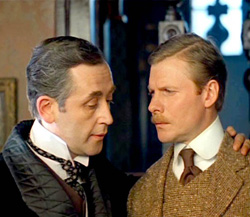
It’s worth mentioningthat Livanov’s Holmes wholly alters the dynamic between himself and his biographer by being a decent, likable fellow—one who goes so far as to warn his petit grime-faced Baker Street Irregulars that smoking is bad for their health, an unheard-of vote for preventive care that left me gaping at my laptop. When he’s bored and peppering their parlor wall with bullet pocks, he’s simply bored and peppering their wall with bullet pocks; one doesn’t suspect chemical dependency, bipolar disorder, any shade of autism, the mean reds, or even a case of the Mondays. This Holmes apologizes when he’s brusque, smiles at the Yard, and makes his shoulder available as a comfy pillow for his head-injured doctor friend. If you stood Livanov’s affable sleuth next to Cumberbatch’s steely Holmes and suggested they were the same person, your brain would curdle into California-style cottage cheese.
So Solomin’s Watson has fewer hurdles to leap, fewer mine fields to navigate. He’s still quietly rapt, resourceful, intelligent, and strangely studious—as if he’s studying Sherlock Holmes all the while, wondering at his good fortune in being asked along for the ride. I’ve been told that prior to the fall of the Iron Curtain, he was the definitive Watson to many Easterners, who lacked the internet to widen their options—if so, and I firmly believe that account to be true, he was a wholly admirable one.
CONCLUSION: Solomin has a remarkably sane Holmes to deal with, but he’s calm and capable. Not to mention adorable. A multicultural must.
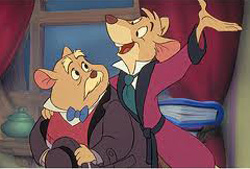 VAL BETTIN; The Great Mouse Detective (1986)
VAL BETTIN; The Great Mouse Detective (1986)
Wherein one Dr. David Q. Dawson is kindly and brave and moustachioed.
CONCLUSION: Mouse or man, John Watson is a creature for all seasons.
MARTIN FREEMAN; Sherlock (BBC series, 2010—the Earth Grows Cold and the Stars Fade)
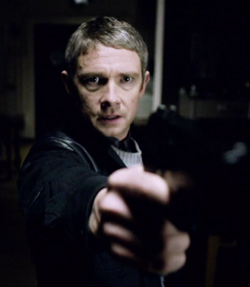
Which it will be. Just you wait and see.
John Watson is crippled by psychosomatic pain and by a heartbreaking problem common to so many, many of us: nothing ever happens to him. Moffat and Gatiss take the war hero with the obvious limp and resolutely spit on every opportunity to pity him. For this man is not pitiable. He is the least pitiable fellow you’ll ever encounter. He is driven to a point of enormous pressure, seething at his choices and his noble intentions and his bleak results, and what he needs is a battlefield. And when Benedict Cumberbatch’s Sherlock Holmes prances in, all public school cheekbones and riding crops employed in the name of science, he finds himself in his natural element once more.
Watching Holmes and Watson play out in the modern world is delightful in itself, granted. In an effective retelling, I mean to say. That is, an update which—rather than chuckling at everything we hold dear—shaves a bit of black truffle on our standards, drizzles artisanal olive oil over our expectations, and says, Voila! Votre tres tres moderne alternate universe, Mesdames et Messieurs. Bon appetit.
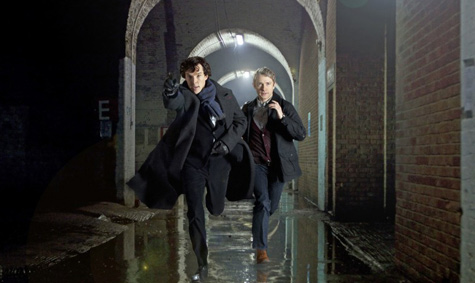 But much of that charm can be laid squarely at the door of Martin Freeman, and I’ll tell you why I imagine this is so: he is small, clever, charming, and wounded. But he is also large (in the eyes of Cumberbatch’s shocked and delighted Sherlock); dense (when it comes to being kidnapped); callous (his girlfriends don’t care for him); and unstoppable (if you think a limp and a shoulder wound and a war can stall this nuclear-powered freight train, think again). In every way, he is Everyman, and yet he’s no one we’ve ever seen before. He embodies his own contradictions while being completely at ease with them. He would prefer to be blown to pieces than imagine a world without Sherlock Holmes in it. And he doesn’t find that weird.
But much of that charm can be laid squarely at the door of Martin Freeman, and I’ll tell you why I imagine this is so: he is small, clever, charming, and wounded. But he is also large (in the eyes of Cumberbatch’s shocked and delighted Sherlock); dense (when it comes to being kidnapped); callous (his girlfriends don’t care for him); and unstoppable (if you think a limp and a shoulder wound and a war can stall this nuclear-powered freight train, think again). In every way, he is Everyman, and yet he’s no one we’ve ever seen before. He embodies his own contradictions while being completely at ease with them. He would prefer to be blown to pieces than imagine a world without Sherlock Holmes in it. And he doesn’t find that weird.
And neither do we. His John Watson will be talked about for years to come—one hopes because new episodes will be showering down upon us like so much spring rain. But if only for these six episodes, all hail Martin Freeman for recognizing what John Watson always was: an impossibility. And one hell of a good shot.
CONCLUSION: You can take the soldier out of the battlefield, but you can’t take the battlefield out of the soldier. The definitive new Watson for the 20-teens, all respect to his predecessors.
All of Part 1’s incarnations of Watson are here.
And there you are . . . with high hopes for more invaluable military-medico companions still to come!
Lyndsay Faye is the author of Dust and Shadow and The Gods of Gotham, coming March 15th, 2012 from Amy Einhorn Books/Putnam. She tweets @LyndsayFaye.

Excellent posts! (parts I and II)
While I’m fond of Edward Hardwicke’s portrayal I think I like Martin Freeman the best. His characterization of Watson seems to intrigue Holmes the most, and there are things about him that Holmes doesn’t immediately discern.
Thank you for including The Great Mouse Detective. And thanks for this :[quote]If you stood Livanov’s affable sleuth next to Cumberbatch’s steely Holmes and suggested they were the same person, your brain would curdle into California-style cottage cheese.[/quote]I think I love Hardwicke and Freeman the most, but Jude Law’s not in another zip code. Every Watson has to deal with his Sherlock, whether its with exasperation, amusement, or awe. But Freeman’s the only one who seems like he and his Sherlock inflict mutual, even casual, cruelties on each other that make their sacrifices even more breathtaking. And still, their safe word remains unspoken.
Brava!! Very well done.
A very-very likeable recap of the beloved doctor, in all his “Avatar”-s. Ms. Faye ‘knows’ her Watsons really well!
I agree…I always say that what makes a good Sherlock Holmes adaptation is less Sherlock Holmes but Dr. Watson. My favourite of the classic ones is easily Solomin, who beats them all with a boyish charme which makes him hard to forget. But he is beaten by a small margin by Freeman, partly because he is such a damned good actor, but also because this is the first adaptation which asks the question why John should put up with Sherlock and why Sherlock would take him along in the first place. And I like the answer (the genius needs an audience, and you are not hauted by the war, you miss it) spot on, in canon and very belivable. I think it’s no accident that those are also the adaptations which really take time to establish the friendship between them. It always bothered me about the Granada version that they cheated concerning two of the three most important events in the books – the first meeting and Watson’s marriage. (The third is naturally Sherlock Holmes “death”)